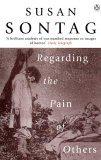How do performances deal with traumatic subjects? Performance may create a social space to express and explore painful subjects, using the fictional space of the stage as a way to deal with difficult issues.Issues not usually confronted in a social arena may be tackled through performance. Susan Sontag claims that representations of suffering ensure that traumas are not forgotten.
Sontag wrote that representations of suffering must not be pure spectacle. She maintains that images of pain must never be removed from an awareness of suffering as a lived reality. Displaying images of suffering as spectacle universalises experiences of the few and trivialises trauma, suggesting ‘perversely, unseriously, that there is no real suffering in the world’ (Regarding the Pain of Others, 2003, p. 99). It is therefore vital to represent suffering as a lived reality, as experiences that are endured by individuals and groups. Sontag concludes that we should ‘let the atrocious images haunt us’, to continually consider ‘what human beings are capable of doing’ (Regarding the Pain of Others 2003, p. 102). Accepting and acknowledging cruelty and depravity is integral to reaching maturity, maintains Sontag.
 It may be vital to stage suffering in order to advocate for acknowledgement of particular points of view or events. Representations of pain can ensure that traumatic events are not overlooked by history, and that those who were victimised by events have the power to describe circumstances. Representations of suffering may inspire awareness and acknowledgement in spectators, encouraging them to question their world-views. Sontag’s analysis provides a framework for performance to encourage those who do not have first-hand experiences of the depicted trauma to respond ethically to suffering. While only a minority of people in the world have the ‘dubious privilege’ of choosing to be a spectator, to be able to judge the suffering of others from a safe distance, this must not enable a disconnection from pain.
It may be vital to stage suffering in order to advocate for acknowledgement of particular points of view or events. Representations of pain can ensure that traumatic events are not overlooked by history, and that those who were victimised by events have the power to describe circumstances. Representations of suffering may inspire awareness and acknowledgement in spectators, encouraging them to question their world-views. Sontag’s analysis provides a framework for performance to encourage those who do not have first-hand experiences of the depicted trauma to respond ethically to suffering. While only a minority of people in the world have the ‘dubious privilege’ of choosing to be a spectator, to be able to judge the suffering of others from a safe distance, this must not enable a disconnection from pain.